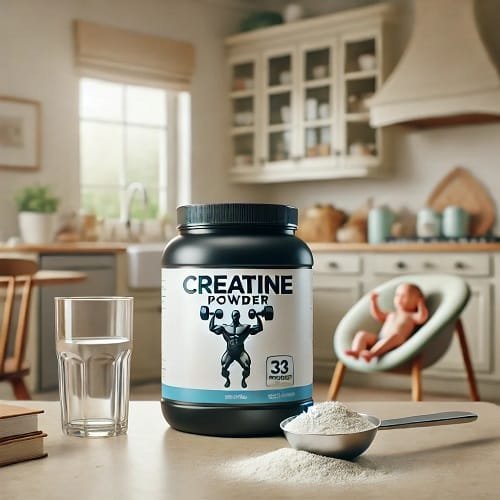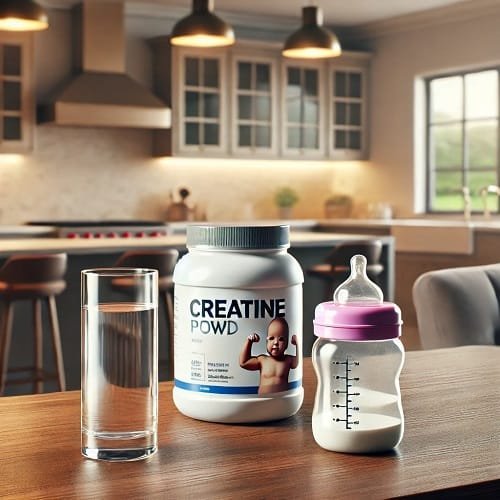Introduction
As a new mother, balancing the demands of motherhood with your personal fitness goals can be a challenge. If you’re wondering, “Can I take creatine while breastfeeding?”, you’re not alone. Many new moms face this very question when they’re trying to get back into shape or maintain their athletic routine after giving birth. Creatine and breastfeeding might seem like an odd combination, especially with concerns about the safety of various supplements during this delicate period.
Creatine is a naturally occurring compound found in muscle cells, commonly used as a supplement to enhance athletic performance and support muscle recovery. It’s often a go-to for individuals looking to increase strength, endurance, and overall fitness levels. However, for breastfeeding mothers, the question arises: is creatine safe to take while nursing?
Maintaining a healthy and balanced approach is essential when you’re breastfeeding, as what you consume can impact both you and your baby. That’s why it’s crucial to consider the safety and potential risks of any supplement, including creatine. In this article, we will provide expert-backed information about creatine safety, helping you make an informed decision about whether to include creatine and breastfeeding in your routine. Whether you’re looking for answers about side effects or the benefits of creatine, we’ve got you covered.
What is Creatine?

If you’re wondering, “Can I take creatine while breastfeeding?”, before diving into its use, it’s essential to understand the basics of creatine and its function. Creatine is a natural compound present in muscle cells that helps generate energy during intense physical activity. Essentially, creatine helps supply your muscles with the energy they need to perform at their best, particularly during short bursts of intense activity, like weightlifting or sprinting.
In the body, creatine is converted into creatine phosphate, which is then used to regenerate adenosine triphosphate (ATP), the primary energy carrier in cells. This process is essential for improving athletic performance, particularly in activities that require strength and power. As a result, creatine uses in fitness are widespread, as it’s often taken to improve performance, increase strength, and enhance muscle recovery.
For those involved in bodybuilding or strength training, creatine benefits are especially notable. It helps increase muscle mass, support quicker recovery between workouts, and boost endurance for intense training sessions. While creatine is generally considered safe for most people, it’s important to approach supplementation with caution—especially for breastfeeding mothers.
Before deciding whether to incorporate creatine into your routine while nursing, it’s essential to fully understand its role and how it may impact your body during breastfeeding.
The Safety of Creatine During Breastfeeding

One of the most common questions breastfeeding mothers ask is, “Can I take creatine while breastfeeding?” This is an important concern, as many moms are cautious about what they put into their bodies while nursing. Creatine breastfeeding safety is not a well-researched area, as there are limited studies specifically examining the effects of creatine on lactation. However, we can look at the general safety profile of creatine and its potential impact on breastfeeding.
Experts agree that creatine while nursing may be safe for many women, but the lack of direct research on its effects during breastfeeding means there are some uncertainties. Healthcare providers often recommend that mothers avoid unnecessary supplements unless they are essential for health reasons. In the absence of studies, it’s best to err on the side of caution and consult with a doctor before introducing any supplement into your routine while breastfeeding.
Some of the potential risks associated with creatine use, particularly during breastfeeding, include dehydration and its effect on kidney function. Creatine draws water into muscles, which can increase the risk of dehydration if fluid intake isn’t sufficiently increased. Dehydration can be a particular concern when breastfeeding, as hydration levels are critical for milk production. Furthermore, creatine use can sometimes strain kidney function, especially in individuals with preexisting kidney conditions.
While creatine is safe for most people, is creatine safe for breastfeeding moms is a question that requires more individual consideration. It’s important to speak with a healthcare provider to weigh the potential risks and determine if creatine supplementation is right for your personal situation. They may suggest alternatives or provide guidance based on your specific health needs.
Potential Benefits of Creatine While Breastfeeding

It’s also worth exploring the potential benefits of creatine for mothers during this time. Many women experience fatigue and a lack of energy in the postpartum period, which can make it difficult to stay active and maintain physical fitness. Creatine supplementation may offer some benefits in supporting postpartum recovery and improving energy levels.
One of the key advantages of creatine during breastfeeding is its potential to aid muscle recovery. After childbirth, your body may be weak and fatigued, especially if you’re balancing the physical demands of nursing and caring for a newborn. Creatine and postpartum recovery are linked, as creatine helps promote quicker recovery in muscles after intense physical activity. It can be particularly useful for moms who want to return to their workout routines but need help rebuilding strength and endurance.
In addition to muscle recovery, creatine may also help reduce general fatigue. The energy-boosting properties of creatine can support the body’s need for physical activity, making it easier to stay energized throughout the day. This is especially important for new mothers, who often deal with sleepless nights and constant caregiving duties. Having enough energy to get through the day can make a big difference in mental and physical well-being.
Furthermore, some studies suggest that creatine may have cognitive benefits, including improved mental clarity and focus. This can help mothers who are juggling many tasks at once and need a little extra mental energy. Although more research is needed, there is potential for creatine to support new mothers in their physical and mental recovery during breastfeeding.
Possible Side Effects of Creatine During Breastfeeding

It’s also crucial to understand the possible side effects. While creatine is generally considered safe for many people, it can have some creatine side effects that might be more pronounced during breastfeeding. As with any supplement, it’s important to consider how your body will respond and how it could impact your health while nursing.
One of the most common side effects of creatine while breastfeeding is water retention. Creatine helps draw water into the muscles, which can lead to temporary bloating and an increase in body weight due to the additional water held in the muscles. For many people, this is harmless, but it can be uncomfortable. New mothers may find that this retention makes them feel sluggish or heavier than usual, which could affect their physical activity and comfort.
Another potential issue is digestive discomfort, which is a common creatine side effect. Some users experience bloating, cramping, or nausea when taking creatine, particularly in higher doses. These digestive disturbances may be exacerbated for breastfeeding mothers, as the body is already undergoing significant changes and additional stress during the postpartum period.
A critical concern for breastfeeding mothers is creatine dehydration. Creatine can increase the body’s need for water due to the way it pulls water into muscle tissues. If you’re not properly hydrating, this can lead to dehydration, which can impact both your milk production and your overall health. Dehydration is a significant risk when breastfeeding, as staying hydrated is crucial for maintaining an adequate milk supply. It’s essential to drink plenty of water if you decide to take creatine while nursing.
Finally, it’s worth noting that creatine risks can vary from person to person. While some people may have no side effects, others might be more prone to them. Consulting with a healthcare provider can help determine if creatine supplementation is right for you and how to mitigate any risks.
ALSO READ
Rooibos Tea for Breastfeeding: Benefits and Safety
Can You Take Pre-Workout While Breastfeeding Safely
Is it safe to drink kombucha while breastfeeding?
Can You Get Filler While Breastfeeding?
How to Safely Take Creatine While Breastfeeding

It’s essential to approach this supplementation with caution. While creatine use is generally safe for most people, taking it while nursing requires careful consideration to ensure both your health and your baby’s safety. Here are some practical tips to help you safely incorporate creatine while nursing.
First and foremost, creatine dosage is key. For breastfeeding mothers, it’s essential to start with a low dose to assess how your body reacts. A common dosing protocol is to begin with 3-5 grams per day, which is a standard amount that can be safely tolerated by most people. You can adjust the dosage depending on your response, but avoid high doses (e.g., 20 grams per day) that some bodybuilders may use for “loading.” High doses can increase the risk of creatine side effects such as bloating and digestive discomfort, which may be particularly problematic for new mothers.
Hydration is another critical aspect when it comes to safe creatine use. Since creatine draws water into the muscles, it’s crucial to stay well-hydrated. Hydration with creatine becomes even more important during breastfeeding because dehydration can impact your milk supply and overall health. Be sure to drink plenty of water throughout the day—aim for at least 8-10 glasses of water daily, or more if you’re taking creatine.
Additionally, it’s wise to introduce creatine gradually to monitor any potential reactions. Start with a smaller dose, and pay attention to any changes in your body, such as increased thirst, digestive discomfort, or changes in milk production. If you notice any issues, it may be helpful to pause the creatine supplementation and consult with your healthcare provider. Taking a careful, measured approach will help ensure that you’re using creatine in a way that supports your health and breastfeeding journey.
Consulting a Healthcare Provider

When considering adding a supplement like creatine to your routine while breastfeeding, consulting a healthcare provider is a crucial step. The question, “Can I take creatine while breastfeeding?”, is one that should be addressed with expert guidance to ensure both your health and your baby’s well-being. It’s always best to discuss any new supplement with your doctor or pediatrician before beginning, especially during the delicate postpartum period.
A healthcare provider will take into account individual health factors, including your overall health, any pre-existing conditions, and your specific needs as a breastfeeding mother. Doctor advice on creatine can help clarify potential risks and guide you in making an informed decision based on your unique situation. For instance, if you have a history of kidney issues or dehydration, your doctor may recommend a more cautious approach to creatine supplementation.
When approaching the conversation, it’s important to be open and transparent about your fitness goals and the reasons you’re considering creatine use. Sharing how you’ve been feeling, including energy levels, recovery after workouts, and any concerns about postpartum fatigue, can help your healthcare provider better understand your needs. Healthcare provider breastfeeding supplements advice is tailored to prioritize your milk supply and overall health, so make sure to ask specific questions about how creatine could impact these areas.
Remember, your healthcare provider is there to help guide you to the best choice for you and your baby’s health. Their insight is invaluable in ensuring that your supplementation plan is safe and effective.
Alternative Supplements for Breastfeeding Mothers

If you are unsure about the safety or potential risks, there are several alternative supplements for breastfeeding moms that may better align with your needs. These alternatives are commonly recommended by healthcare professionals for their safety and benefits during nursing.
Omega-3 fatty acids are one such supplement, often found in fish oil. They are essential for both maternal health and baby development, particularly for brain and eye health. Many breastfeeding mothers choose omega-3 as a safe and effective supplement, supporting both mom’s energy levels and overall well-being.
Iron is another important supplement, especially for mothers who may have experienced significant blood loss during childbirth. Iron helps combat fatigue and supports healthy blood production, which is crucial for both mom and baby during breastfeeding. Postpartum supplements like iron are widely recommended to prevent or treat anemia.
Calcium is another essential nutrient, important for bone health and muscle function. Since breastfeeding can deplete calcium levels in the body, supplementation can help maintain strong bones and teeth for both mother and baby.
These safe supplements during breastfeeding are well-researched and have established safety profiles for nursing moms. If you’re looking for alternatives to creatine, these options offer beneficial support without the potential concerns that creatine supplementation may raise. Always check with your healthcare provider to ensure you’re choosing the best supplement for your individual health needs.
Frequently Asked Questions (FAQ)
Can I take creatine while breastfeeding if I have no health conditions?
While creatine is generally safe for most people, it’s essential to consult your healthcare provider before using it while breastfeeding. Even without pre-existing health conditions, individual reactions to supplements can vary, so it’s always best to get professional advice.
Does creatine affect breast milk supply?
There’s no direct evidence linking creatine use with a reduction in breast milk supply. However, dehydration—one potential side effect of creatine—can impact milk production. Therefore, it’s essential to stay well-hydrated if you choose to take creatine.
What should I do if I experience side effects while taking creatine?
If you notice any side effects, such as bloating, digestive discomfort, or dehydration, it’s important to stop taking creatine and consult your healthcare provider. They can help determine if the supplement is appropriate for you or recommend an alternative.
4. Are there any long-term effects of taking creatine while breastfeeding?
Currently, there’s limited research on the long-term effects of creatine supplementation during breastfeeding. It’s important to proceed with caution and consult your doctor for personalized advice, especially if you plan to use it over an extended period.
Conclusion
In conclusion, “Can I take creatine while breastfeeding?” is a question that requires thoughtful consideration. While creatine offers potential benefits for energy and recovery, safety should always be the top priority for breastfeeding mothers. Safe creatine use during breastfeeding can be possible, but only with professional guidance. Be mindful of hydration, dosage, and any potential side effects. Consulting with your healthcare provider ensures that you make the best decision based on your individual health and needs. Always prioritize your health and your baby’s well-being when considering any new supplement.






